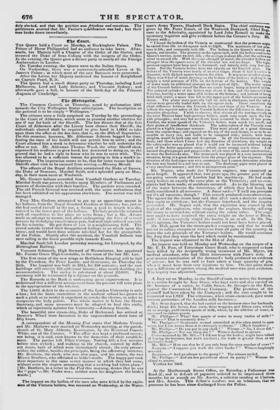man's Arms Tavern, Shadwell Dock Stairs. The chief evidence wes
given by Mr. Peter Ewart, of the Woolwich Dockyard, Chief Engl. neer to the Admiralty, appointed by Lord John Russell to make tee necessary inquiries and give evidence before the Coroner's Jury. Me. Ewart said- " I found the boilers of the Victoria so constructed that the pressure might be varied from 31b. on the square inch to 1311b. The maximum of low pre,. sure is 51b., and commonly only 31b. The boilers in the Queen's service es
its
square, not circular. The pressure on the square inch, with the boilers used in the Queeu's service, never exceeds 51b. ; the average is about 41b., hut the orders ars never to exceed 51b. With the sante strength of metal, the circular boilers are stronger than the square ours, if the circular are not too large. The high. pressure engines have been used iti Cornwall, and latterly with very few 4126 dents. But the Victoria boilers were not exactly on the Cornish plan. 'fix boilers of the Victoria were neatly of an oval shape, about 6 feet 5 iitelws diameter, with 21-inch spaces between the sides. It was more at other plaees. There was 9 feet of water pressing on the bottom of the boilers ; making Im
weight a total pressure of 171b. on the bottom of the boilers. The mm eight of water made an additional pressure on that part of 361b. The water 'paces
of the Cornish boilers round the flues are much larger, being at leest 6 inchee. The external cylinder of the boiler* was about 6 feet, and the iuternal :3 feet 9 inches, leaving a water space of 6 inches at the bottom ; and instead of tieing tilled with water, a space was left in the upper part of' the boilers occupied by
steam. The plates were generally half an inch in thickness, and the Eldfoy. valves were generally loaded 451b. on the square inch. Those constitute the chief difference between the Cornish boilers and those of the Victoria. I at- tribute the superior safety of the Cornish boilers to the difference in their con.
struction altogether. I wish to observe, that almost all the towing-vessels OR the river Thames have high-pressure boileis, made very much upon the Cor- nish principles ; and very few accidents have occurred to them of late years. Further, the water spaces of the Victoria's boilers were much too small, and
their plates of insufficient thickness. The safety-valves of the Victoria were placed in a highly improper manner. They were placed at a great distance from the engine-stage, and exposed on the top of the cook-house, so as to be at- cessible to every one, and liable to be tampered with ; which, with lever weights, would be both easy and dangerous. In all the Government steam- boats, and those which I have had any direction of elsewhere, the weight on the safety-valve was so placed that it could not be increased without taking part of the boiler apparatus away ; which must occupy much time. I ex. amined the glass gauges and gauge-cock*, which were of the usual construction; as wet e the feed-cocks also. The steam-cock was placed in a very inconvenient situation, being at a great distance ft om the proper place of the engineer. The situation of the feed-pipes was very convenient, but 1 cannot determine whether the iron was heated to a red heat or not. The discharge•pipes were placed in a very excellent manner ; and this is an important point."
Mr. Napier, who made the Victoria engines, was examined at great tenth. It appeared that, two years ago, the greater part of the sea-going vessels out of London had his machinery. He had mode many boilers on exactly the same plan as the Victoria's ; and no come plaints had been made, or accidents occurred. As to the blowing out of the water between the interstices, of which they bad heard, he really considered it all nonsense. A Juror said—" You'll not persuade me it's all nonsense, though." This remark produced some altercation. The agents for the steam-boat said that after such a decisive opinion they ought to withdraw ; but the Coroner interfered, and the inquiry pi weeded. Mr. Napier said, that the explosion was caused by the neglect of the engineers, who stopped the engines, thereby suffering the steam to accumulate, without easing the safety- valve. The engi- neer ought to have removed the extra weight on the lever at Black- wihh: it was excessively stupid his having it on at all. In Mr. Na. pier's opinion, the Victoria's boilers could not have been better placed.
Mr. Hall, agent for the steam-packet company, said that he would persist in calling competent witnesses from all parts of the country, to prove the sale principle of' the Victoria's boilers. He would convince the Jury that they were the best which could be constructed.
The inquest was adjourned to the 31st of July.
An inquest was held on Monday and Wednesday on the corpse of a Mr. T. D. Pow, of Tottenham Court Road, who is suspected to have been killed by the designedly wrong treatment of Mr. Myers, his medical attendant, who had illicit intercourse with Pow's wife. A post ntortent examination of the deceased's body produced no evidence of poison ; but he was said to have taken a large quantity of gin, when it must have been very injurious to him. On this point there was a difference of opinion among the medical men who gave evidence. The inquiry was adjourned.


























 Previous page
Previous page